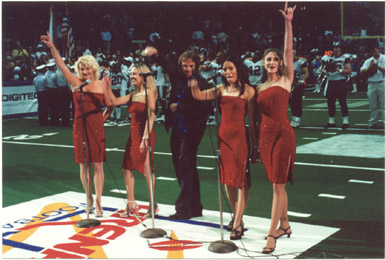
It used to be, say in the 1970s, that sitting during the national anthem at baseball games was tolerated, though you got some stares. Now I try hard to be in line at the concession stand; the beginning of the warbling is the sign to get the popcorn.
Sports columnist Dave Zirin jumps into the fray:
The US is in open diplomatic - and covert military - conflict with the Venezuelan government and its President Hugo Chavez. The Bush Administration has played a role in two attempted coups against Chavez, despite the leader's majority support among Venezuelans. What does [Ozzie] Guillen, [manager of the Chicago White Sox] think about this? I will not make the assumption that Guillen, like many wealthy ex-pat Venezuelans, sees Chavez as somewhere between Idi Amin and Satan, but wouldn't it have been interesting [for Sports Illustrated to ask when writing a profile]? Especially if Guillen, the first Venezuelan manager in baseball history, feels pressure to prove his patriotic bonafides [by demanding his players stand for the US anthem.]. . .The custom of playing the anthem to open sporting events is not particularly old. Singing "The Star Spangled Banner" was introduced at the 1918 World Series in a fit of World War I patriotism, but it was only adopted as the national song in 1931. It only became an everyday practice during World War II, when baseball owners wanted to counteract any rumbling that having grown men play a game for their profit might not be the most valuable contribution to the war effort.
We are watching players from the US, Latin America, and increasingly Asia, hit baseballs made in Costa Rica and field in gloves made in Taiwan. The only purpose served by the national anthem is to remind the many nationalities in the stands and on the field exactly whose foot stands internationally on their collective neck. Sports Illustrated and Ozzie Guillen may think that coercing players to stand is a great step forward for team unity, but if these Sox unravel, we should examine whether the bruised egos are colored red, white and blue.
Richard C. Crepeau, a baseball historian, remarks ruefully the anthem "has become an occasion for entertainers to display their talents or lack thereof, fans to create new cheers, and the networks to run commercials." Whenever the national anthem is performed at University of Oklahoma sporting events, the last line becomes, "and the home of the 'SOONERS!'" The patriotism establishment, under the patronage of Laura Bush, have currently started a campaign to combat "anthem apathy," by encouraging people to learn the words.
Somehow I don't think the words they have in mind are those of the fourth verse. Frances Scott Key was writing to celebrate his young country holding off an attack by the mighty British empire. He wasn't talking about waging preemptive war on someone else's land when he captured his relief at seeing hope that his country would survive:
Oh! thus be it ever, when freemen shall standWhile the atheists among us may rightly object to the theist assumption here, the country would be a lot better off if we could remember that war is desolation and peace precious.
Between their loved home and the war's desolation!
Bles't with victory and peace, may the heav'n rescued land
Praise the Power that hath made and preserved us a nation.
1 comment:
A good compromise would be to put a time limit on anthem singing, to stop all these divas and divos from dragging it out. Tell the singers that their mic will be cut off 30 seconds after they start singing, and warn them that they'll be loudly booed if they haven't finished the song.
Same goes for "God Bless America." Kate Smith's version is practically at rock tempo, compared with the lethargic performances at today's ball parks.
Post a Comment